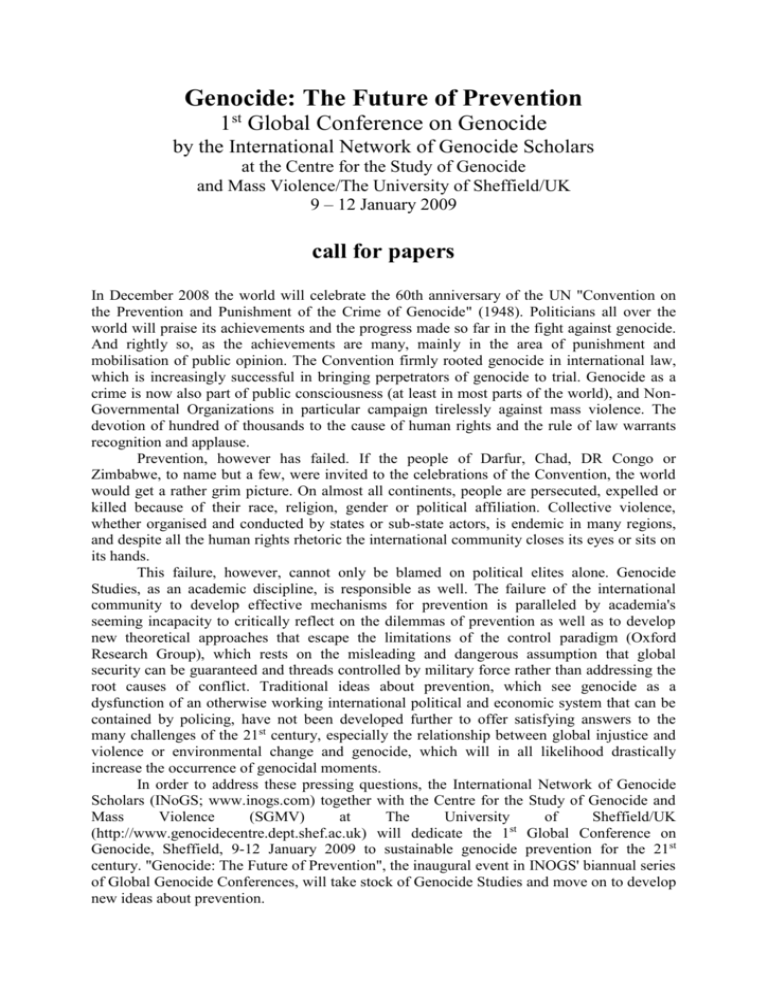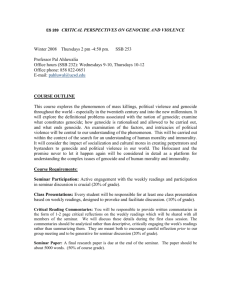Genocide: The Future of Prevention
advertisement

Genocide: The Future of Prevention 1st Global Conference on Genocide by the International Network of Genocide Scholars at the Centre for the Study of Genocide and Mass Violence/The University of Sheffield/UK 9 – 12 January 2009 call for papers In December 2008 the world will celebrate the 60th anniversary of the UN "Convention on the Prevention and Punishment of the Crime of Genocide" (1948). Politicians all over the world will praise its achievements and the progress made so far in the fight against genocide. And rightly so, as the achievements are many, mainly in the area of punishment and mobilisation of public opinion. The Convention firmly rooted genocide in international law, which is increasingly successful in bringing perpetrators of genocide to trial. Genocide as a crime is now also part of public consciousness (at least in most parts of the world), and NonGovernmental Organizations in particular campaign tirelessly against mass violence. The devotion of hundred of thousands to the cause of human rights and the rule of law warrants recognition and applause. Prevention, however has failed. If the people of Darfur, Chad, DR Congo or Zimbabwe, to name but a few, were invited to the celebrations of the Convention, the world would get a rather grim picture. On almost all continents, people are persecuted, expelled or killed because of their race, religion, gender or political affiliation. Collective violence, whether organised and conducted by states or sub-state actors, is endemic in many regions, and despite all the human rights rhetoric the international community closes its eyes or sits on its hands. This failure, however, cannot only be blamed on political elites alone. Genocide Studies, as an academic discipline, is responsible as well. The failure of the international community to develop effective mechanisms for prevention is paralleled by academia's seeming incapacity to critically reflect on the dilemmas of prevention as well as to develop new theoretical approaches that escape the limitations of the control paradigm (Oxford Research Group), which rests on the misleading and dangerous assumption that global security can be guaranteed and threads controlled by military force rather than addressing the root causes of conflict. Traditional ideas about prevention, which see genocide as a dysfunction of an otherwise working international political and economic system that can be contained by policing, have not been developed further to offer satisfying answers to the many challenges of the 21st century, especially the relationship between global injustice and violence or environmental change and genocide, which will in all likelihood drastically increase the occurrence of genocidal moments. In order to address these pressing questions, the International Network of Genocide Scholars (INoGS; www.inogs.com) together with the Centre for the Study of Genocide and Mass Violence (SGMV) at The University of Sheffield/UK st (http://www.genocidecentre.dept.shef.ac.uk) will dedicate the 1 Global Conference on Genocide, Sheffield, 9-12 January 2009 to sustainable genocide prevention for the 21st century. "Genocide: The Future of Prevention", the inaugural event in INOGS' biannual series of Global Genocide Conferences, will take stock of Genocide Studies and move on to develop new ideas about prevention. We therefore invite suggestions for panels and papers on all aspects of the study of genocide and mass violence, past, present and future. Submissions should reach us no later than 15 July 2008. Brief abstracts (250 words per paper, panel suggestions should additionally briefly state the rationale of the panel, including short CVs and institutional affiliation; all in one word file) should be e-mailed to Tricia Ellis-Evans (tricia@paceprojects.co.uk). Topics of particular interest would include (but are not restricted to) the following: -Prevention -International law and genocide -Education and genocide prevention -Holocaust and its representation -Genocide in art, literature and film -Colonial mass violence -Cultural genocide and ethnocide -Reconciliation, restitution and recognition -Genocide denial -Politics of apology -Forms of remembrance and memory politics -Climate change and mass violence -Social origins of mass violence -Genocide and the International Order -Humanitarian interventions: chances and problems -Gender and violence - Late Ottoman population policy - Soviet mass violence - From Indonesia to Cambodia: genocides in Cold War Asia - From Biafra to Darfur: mass violence in post independence Africa We would be grateful, if you circulate this cfp as widely as possible. Juergen Zimmerer Director, Centre for the Study of Genocide and Mass Violence/ University of Sheffield Humanities Research Institute The University of Sheffield 34 Gell Street Sheffield S3 7QY http://www.genocidecentre.dept.shef.ac.uk/ j.zimmerer@sheffield.ac.uk







